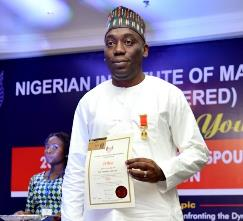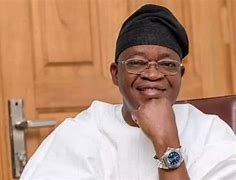The Minister of Marine and Blue Economy, Alhaji Adegboyega Oyetola has reiterated the commitment of the Federal Government to dismantle barriers to the African Continental Free Trade Area (AfCFTA).
He averred that this was the only way to ensure economic development in Nigeria and create new export opportunities for the maritime sector of the economy under the auspices of the Guided Trade Initiative (GTI).
Oyetola gave this assurance in his keynote address at the Maritime Reporters’ Association of Nigeria (MARAN) Annual Lecture (MAMAL) with the theme: AfCFTA: Dismantling Trade Barriers, Navigating Regional Trade which took place yesterday at Providence Hotel, GRA, Ikeja, Lagos.
Represented at the occasion by his Chief Press Secretary, Mr. Ismail Omipidan, the minister stated that the ministry through the Nigerian Ports Authority (NPA) has licensed several Export Processing Terminals (EPTs) which fast-track export procedures and enhance the efficiency of trade processes for AfCFTA.
His words: “In July this year, we recorded a significant milestone in our march to economic recovery, following the inaugural shipment ceremony under the Guided Trade Initiative (GTI) of the African Continental Free Trade Agreement (AfCFTA). For us, it was a crucial step towards an enhanced trade and economic cooperation on our continent.
“In today’s interdependent and globalized world, efficient and cost-effective maritime transportation systems that link global supply chains are the engine that would ultimately fuel economic development and prosperity. Maritime transport is a strategic economic trade enabler because 80% of global merchandise trade by volume is carried out by sea and handled by ports worldwide as estimated by UNCTAD.”
Oyetola who is the immediate past governor of Osun State, argued that by promoting intra-Africa trade through the removal of national barriers, doors of opportunities will open to businesses to reach continental markets, thereby fostering industrialisation, job creation and economic growth.
While pointing out the need for investment in port infrastructure and improvement in our institutional capacities for management and administration, Oyetola expressed optimism that the current thrust of the ministry and its agencies’ drive on port modernisation has
demonstrated the commitment to repositioning the port ecosystem for greater efficiency via various government initiatives and interventions.
According to him, these interventions he reaffirmed are yielding positive results, as affirmed by the Presidential Enabling Business Environment Council (PEBEC). The top performance rating of both the ministry and its agencies, NPA and NIMASA, at the recently- concluded 120 Days Regulatory Reform Accelerator (RRA) is indeed a heartwarming indication of this commitment.
In order to ensure the threshold of unlocking the potentials in the maritime sector of the economy, he called for collaboration of all stakeholders to make it happen in the months ahead.
Continuing, Oyetola said: “To support the successful implementation of the AfCFTA, the Federal Ministry of Marine and Blue Economy has taken bold and decisive steps to significantly enhance the efficiency and competitiveness of Nigerian ports. The licensing of Export Processing Terminals (EPTs) will greatly increase the export of Nigerian commodities and will simplify the shipment of goods under the GTI/AfCFTA. Our pursuit of the establishment of more inland dry ports is another initiative to bring shipping closer to the people and facilitate trade.
“We shall continue to push the boundaries of innovation and excellence, driven by our unwavering commitment to progress and our unrelenting passion for shaping a brighter future for the Marine and Blue Economy sector through various initiatives such as Regional integration and collaboration to drive maritime security and safety; continuous partnerships with the private sector and players to drive efficiency; and innovation; and investment in port IT systems to improve procedure, controls, and turn-around time.
“The combination of blue economy potential and the opportunities offered by AfCFTA hold immense expectation for Africa’s development and economic transformation. There is a compelling need for Nigeria to latch on this momentous opportunity to forge a prosperous and resilient future for Africa, where the blue economy and the AfCFTA converge to drive inclusive, sustainable, and equitable development across the continent, creating a brighter future for generations to come”.











